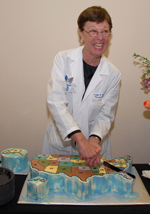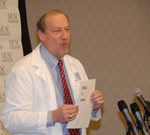|
|

|
Hollings Cancer Center awarded cancer institute designation
|
by Mary Helen Yarborough
Public Relations
The Hollings Cancer Center has attained National Cancer Institute (NCI)
designation, a distinction held by only 63 other cancer centers in the
United States, and the only such institution in the state.
 Dr.
Ray Greenberg, from left, South Carolina first lady Jenny Sanford, Dr.
Andrew Kraft, U.S. Sen. Lindsey Graham, U.S. Rep. Henry Brown and
former Sen. Ernest Hollings. Dr.
Ray Greenberg, from left, South Carolina first lady Jenny Sanford, Dr.
Andrew Kraft, U.S. Sen. Lindsey Graham, U.S. Rep. Henry Brown and
former Sen. Ernest Hollings.
During a dignitary-packed ceremony on March 2, MUSC President Raymond
Greenberg, M.D., Ph.D., called it one of the most important
achievements in MUSC’s history. “Becoming an NCI cancer center is very
difficult,” Greenberg said. “It’s a very competitive peer review
process.”
“It is a very big deal,” said Sen. Lindsay Graham (R-SC). “I want the people in South Carolina to know what a big deal this is.”
NCI based its decision on HCC’s outstanding research facilities,
commitment to research, leadership, and vision. NCI designation is
accompanied by more than $7 million in federal funding to sustain and
grow research efforts at MUSC. Graham said the economic impact to the
state will exceed $65 million a year. The NCI designation awarded to
cancer centers is characterized by scientific excellence and the
capability to integrate diverse research approaches to focus on
the problem of cancer. They play a vital role in advancing the goal of
reducing morbidity and mortality from cancer. One way this is
accomplished is through increased clinical trials that offer patients
new drugs and treatment protocols that would be otherwise unavailable
to them.
Designation also holds the potential to spur South Carolina’s economy
by attracting public and private funding for new endeavors. According
to NCI, designated cancer centers are a major source of discovery of
the nature of cancer and of the development of more effective
approaches to cancer prevention, diagnosis, and therapy. They also
deliver medical advances to patients and their families, educate
health-care professionals and the public, and reach out to underserved
populations. These centers are characterized by strong organizational
capabilities, institutional commitment, and trans-disciplinary,
cancer-focused science; experienced scientific and administrative
leadership, research and advanced cancer research facilities.
 Dr.
Carolyn Reed cuts the cake, which is in the shape of the United States.
The states that have NCI designation were marked with silver buttons. Dr.
Carolyn Reed cuts the cake, which is in the shape of the United States.
The states that have NCI designation were marked with silver buttons.
“Being named one of the top cancer research centers in the country
signals that our researchers and physicians are leaders in discovery,
developing, and delivering cutting-edge treatments based on laboratory
research to patients in South Carolina and beyond,” said Andrew S.
Kraft, M.D., HCC director.
The immediate benefit to patients is increased access to early clinical trials offering promising new treatments.
“This is a distinction earned over many years through collaboration and
innovation by dedicated researchers, clinicians, and staff throughout
Hollings Cancer Center and MUSC,” Kraft said. “By sharing what we know
with other cancer centers and practices throughout our state, we can
step up our war on cancer in South Carolina and beyond. Our citizens
don’t have to leave the state to find the most advanced research and
protocols from an NCI center.”
In 1993, HCC was named for Charleston native, former U.S. senator and
S.C. governor, Ernest “Fritz” Hollings, (D-SC), a legendary leader
whose persuasive speaking and teamwork with fellow Sen. Strom Thurmond
helped win congressional support for South Carolina causes, including
those related to health care.
“This is a true milestone for the Medical University of South
Carolina,” said Hollings. “One can see that the cancer building is a
winner, but now all in the state can know that the doctors and staff of
the cancer center are winners. Dr. Greenberg, Dr. Kraft, Dr. Reves and
Dr. Reed, and the staff all deserve credit.”
Under the leadership of former MUSC President Jim Edwards, DMD, and
with the support of Hollings, MUSC set the goal of obtaining the NCI
designation more than a decade ago, said Greenberg.
“NCI designation for the Hollings Cancer Center has been a top priority
for MUSC for nearly two decades,” said MUSC Provost John Raymond, M.D.
“Designation is one of the pinnacle events for our university.
Designation validates the Hollings Cancer Center as a national resource
that will benefit our patients, students, faculty and staff; thereby
creating a home for cancer prevention and treatment, research,
education, and clinical care. So many people have contributed to this
effort over the years, but special recognition should go to Hollings
Cancer Center director Dr. Andrew Kraft, and his immediate predecessor,
Dr. Carolyn Reed, for their leadership; and congressional delegations,
especially senators Hollings and Graham. We are grateful for their
steadfast support.”
 Dr. Andrew Kraft “bringing it home.” Dr. Andrew Kraft “bringing it home.”
Graham worked with Hollings to “bring home” the designation. Graham
said that HCC’s score was the highest ever earned by an institution
vying for designation in the first round.
“South Carolina is now in the major league of cancer research,” Graham
said. “Cancer is one of the leading causes of death in the nation and
practically every family in our state has been impacted by this
horrible disease. The designation as a National Cancer Institute will
be a game changer for the thousands of South Carolinians with cancer.
Hollings Cancer Center will take its place among an elite group of
institutions in the major leagues of cancer research. The NCI
designation only comes to the best and brightest. It is a compliment to
the men and women who put in countless hours at this facility and
recognition that the Hollings Cancer Center is among the best of the
best in cancer research.”
Friday, Feb. 27, 2009
|
|
|





